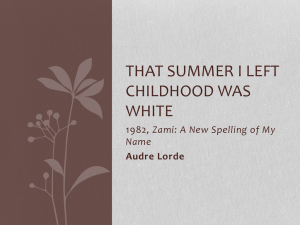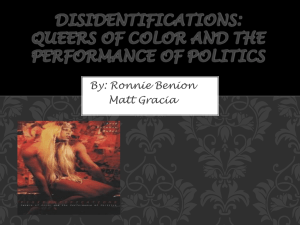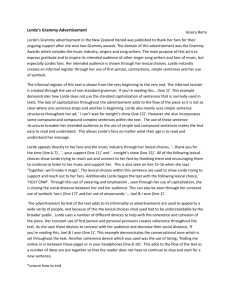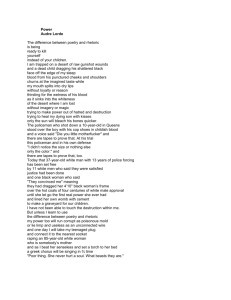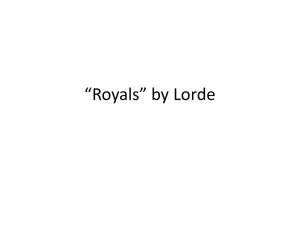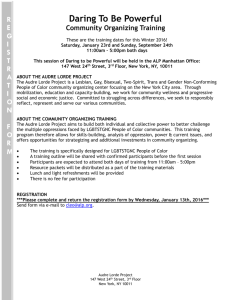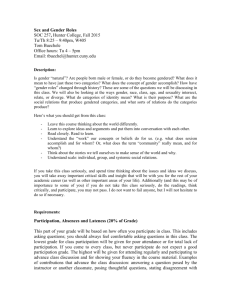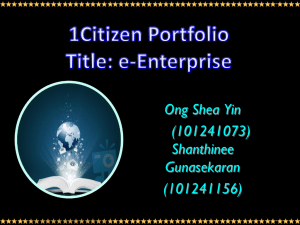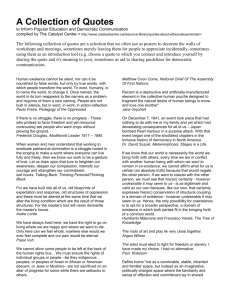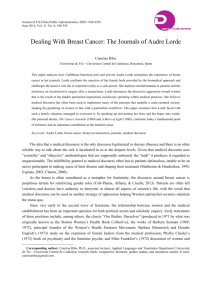Afro-Asian Anger
advertisement
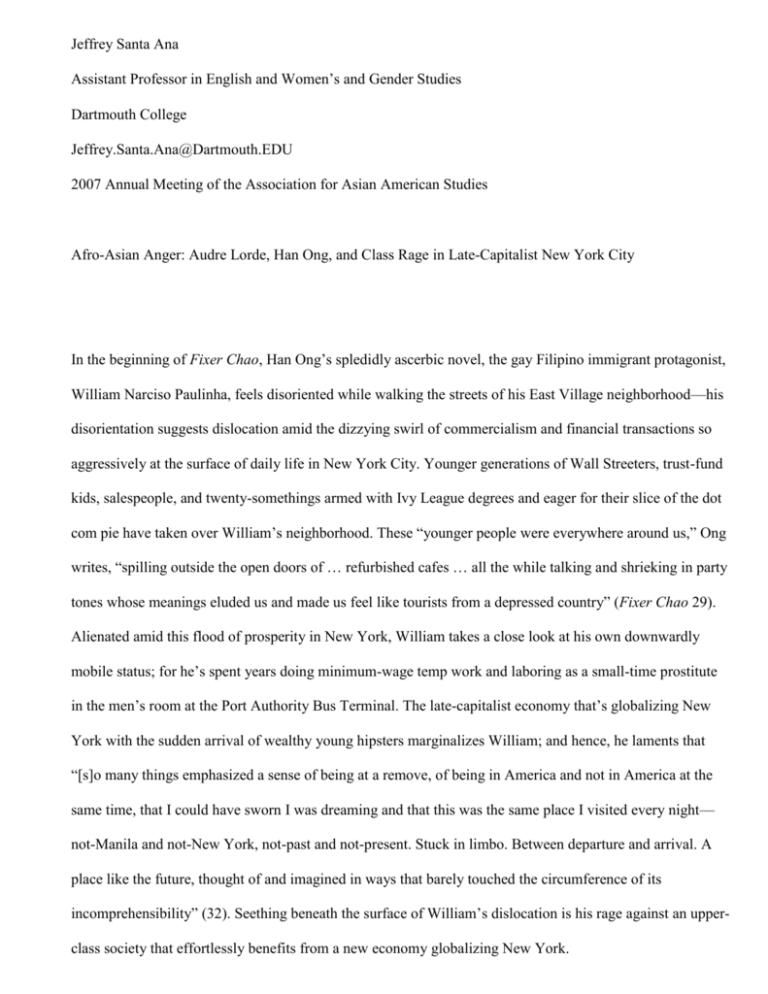
Jeffrey Santa Ana Assistant Professor in English and Women’s and Gender Studies Dartmouth College Jeffrey.Santa.Ana@Dartmouth.EDU 2007 Annual Meeting of the Association for Asian American Studies Afro-Asian Anger: Audre Lorde, Han Ong, and Class Rage in Late-Capitalist New York City In the beginning of Fixer Chao, Han Ong’s spledidly ascerbic novel, the gay Filipino immigrant protagonist, William Narciso Paulinha, feels disoriented while walking the streets of his East Village neighborhood—his disorientation suggests dislocation amid the dizzying swirl of commercialism and financial transactions so aggressively at the surface of daily life in New York City. Younger generations of Wall Streeters, trust-fund kids, salespeople, and twenty-somethings armed with Ivy League degrees and eager for their slice of the dot com pie have taken over William’s neighborhood. These “younger people were everywhere around us,” Ong writes, “spilling outside the open doors of … refurbished cafes … all the while talking and shrieking in party tones whose meanings eluded us and made us feel like tourists from a depressed country” (Fixer Chao 29). Alienated amid this flood of prosperity in New York, William takes a close look at his own downwardly mobile status; for he’s spent years doing minimum-wage temp work and laboring as a small-time prostitute in the men’s room at the Port Authority Bus Terminal. The late-capitalist economy that’s globalizing New York with the sudden arrival of wealthy young hipsters marginalizes William; and hence, he laments that “[s]o many things emphasized a sense of being at a remove, of being in America and not in America at the same time, that I could have sworn I was dreaming and that this was the same place I visited every night— not-Manila and not-New York, not-past and not-present. Stuck in limbo. Between departure and arrival. A place like the future, thought of and imagined in ways that barely touched the circumference of its incomprehensibility” (32). Seething beneath the surface of William’s dislocation is his rage against an upperclass society that effortlessly benefits from a new economy globalizing New York. In Fixer Chao, Ong excoriates New York’s class society through negative feelings of anger. Rage in his novel expresses the subjection of Asian immigrants like William Paulinha. Yet William’s exclusion from the system that benefits upper-class New Yorkers is not permanent. In a seedy gay bar which has miraculously withstood bourgeois campaigns to clean-up Manhattan, William meets a failed Jewish writer named Shem who’s been ostracized by New York’s literati. The two men concoct a revenge scheme in which William poses as a Feng Shui master named William Chao. Together, William and Shem deceive wealthy New Yorkers who are anxious to keep up appearances by their consumption of the most fashionable multicultural trends. William’s desire for vengeance, I want to suggest, expresses the novel’s anti-capitalist consciousness as a contradiction to economic exploitation. Fixer Chao thus underscores the injustices of social division in a time of inexorable globalization. Rage in this novel registers material damage for immigrants in the U.S. global city—damage such as subjection and exploitation based on racial differences and exclusions. Yet nearly twenty years before Ong wrote his novel, Audre Lorde published her essays and autobiography in which she also excoriates the racial subject’s exploitation under capitalism. We might say that Lorde is Ong’s precursor; for the anger she expresses in Zami, her autobiography, is rage that articulates her struggle to find a sense of “home” and defend her personal worth from exploitation in New York. Her anger targets the oppression produced by capitalism. Her rage enunciates contradictions of surviving as a black lesbian in a profit economy rife with homophobia and discrimination against African Americans. In this paper, I want to suggest that an anti-capitalist consciousness in both Lorde’s and Ong’s narratives emerges from the racial subject’s mediation with subjection under U.S. capitalism. In reading Zami and Fixer Chao through critical theory, I suggest that Lorde’s and Ong’s depictions of oppression allow us to understand the relevance of critiquing racism, sexism, and homophobia in the materialist project of exposing social division under the laws of commodity production. Moreover, it is through their emotions of critical consciousness, and from anger in particular, that Lorde and Ong imply their critique of inequality in capitalist society. This is the political-economic dimension of feeling in their work: to express, from beneath the surface of their writing, anxieties about commercialization and the fragmentation of human life in late capitalism. Ultimately, the violent and alienating global city of New York portrayed by Lorde and Ong—and critiqued through what I’m calling “Afro-Asian anger”—is a backdrop for the ongoing fact of racialized subjection under the capitalist commodity structure. Of the many injustices that outraged Lorde and of the revolutionary politics she advocated to condemn these injustices, it’s her criticism of labor exploitation that remains trenchant for understanding today’s condition of racial injustice and subjection. In Zami, for instance, it’s through experiencing exploitive labor that Lorde asserts her most forceful expression of anger as an emotional contradiction of the capitalist commodity-structure. In 1952 Lorde subsists on a series of menial jobs after enduring tragic loss. Her best friend, Gennie, kills herself after suffering sexual abuse by her father. Implacably upset by her parents’ callous reaction to Gennie’s death, Lorde leaves her family home in Harlem. She stays with friends, briefly attends college, rents her own apartment, and, at eighteen, becomes pregnant. She terminates her pregnancy through an underground abortion that leaves her bleeding in agonizing pain for days. Unemployed and nearly destitute, she leaves New York to find work in the assembly lines of Stamford, Connecticut factories. At Keystone Electronics, a plant that processes quartz crystals used in radio and radar machinery, she operates a commercial x-ray machine, working alongside other black and Puerto Rican women, whose options, like Lorde’s, are limited because they are minority women without college degrees and lack office skills to work in better jobs as secretaries. The work at Keystone Electronics is grueling, unsafe, and offensive in every way imaginable. Lorde indicates that it’s likely the cause of her cancer, which will kill her forty years later; she explains: “Nobody mentioned that carbon tet destroys the liver and causes cancer of the kidneys. Nobody mentioned that the Xray machines, when used unshielded, delivered doses of constant low radiation far in excess of what was considered safe even in those days” (Zami 126). We can sense here Lorde’s struggle to fend off the selfnegation this dangerous work demands from her. Her rage seething beneath her performance of factory labor conveys, inasmuch as it protests, the debasement of workers. This is an objectification process that restricts the workers’ feelings to performing work at the cost of depriving such labor of any humanizing fulfillment. Exploitation takes an immense psychological toll on Lorde. She expresses bad feelings of wanting to do violence to herself—because at one point she reveals that the factory’s horrible conditions make her want to “slit [her own] throat.” Lorde’s negative emotions here demonstrate the social fragmentation and estrangement under objectification. In the brief week’s time that Lorde works at the plant, she finds herself struggling with the classic symptom of alienated labor, in which the machine and the workday merge with and take control of the worker’s self. Any satisfaction to be experienced in fulfilling labor is entirely restricted—negated as each day becomes for her a conflict with mind-numbingly dull work. Anxiously awaiting short breaks throughout the interminable day, Lorde feels the debasement that alienated labor enacts on the worker's self-esteem. Years later, after living in Mexico for most of 1954, Lorde returns to New York in search of work. She is determined to continue her education and enter a career in which she can express her love of reading and writing. However, she must struggle dearly to achieve these goals. Although the Supreme Court had recently made its historic decision to abolish segregation in public schools, racist oppression and exclusion prevail as social norms in the U.S. In New York, Lorde endures work that is degrading, having little choice but to take jobs that impose racist divisions and sexist hierarchies. Through the help of an employment agency, she finds employment as an office assistant in a large hospital—a “girl-Friday-step-n-fetch-it for the head of the accounting department” (188). Her boss is a white woman named Mrs. Goodrich, “an overbearing and awe-inspiring woman,” Lorde explains, “who was the first woman ever to head the accounting department of a major hospital in the State” (188). Working under a dictatorial and bitter Mrs. Goodrich, Lorde suffers her racist insults and belittling orders for subservience: “Mrs. Goodrich told me I walked like a lumberjack, and made too much noise in the halls … I would have to learn to be prompt, even though my ‘people’ were never on time … I cringed secretly as she bawled me out for typing errors, in front of the whole typing pool, then called me across the hall into her private office to pick up a pencil she’d dropped” (188). Hence, working for another woman proves to be just as intensely alienating as laboring at Keystone. The experience again provokes within Lorde feelings of wrath that border on self-destructive bitterness; she writes: “I dreamed of stepping on [Mrs. Goodrich’s face] with an ice pick between my toes. I felt trapped and furious … Mrs. Goodrich became the symbol of a job which I hated (I had really never learned to type) and I came to hate her with the same passion” (188-189). Although the injustice of Mrs. Goodrich’s despotic behavior infuriates Lorde, she learns to mediate her anger so as not to succumb to bitterness. At work, she uses her anger creatively to write poetry, and in so doing, fends off feelings of abjection under alienated labor. “I fell asleep at my desk at every opportunity,” Lorde writes: and upon the slightest provocation, usually in the middle of typing Mrs. Goodrich’s letters. In these mini-sleeps, I would type snatches of poems or nonsense phrases into the middle of straight formal sentences. I never bothered to proofread my letters, but only checked them as a work of art, brushing over the paper for correct margins and no strike-overs. Letters would arrive on Mrs. Goodrich’s desk for her signature neatly and correctly typed, but with appalling sentences tucked into them. (189) Creating poetry under degrading labor conditions becomes for Lorde a mechanism through which to channel her anger, preserving her dignity against racist strictures that keep her from being promoted to levels held by white co-workers. She writes, moreover, as a means through which to defend the perimeter of her worth, but also as an act of imaginatively constructing community, affiliation, and a sense of home that negates feelings of loss and estrangement. To reach this place of self-affirmation, Lorde must embrace the difficult and i ambivalent feelings of pain central to her history and subjectivity as a black lesbian. Using anger thus allows her to critique social oppressions systemized under the profit economy. Similarly, in Fixer Chao, Han Ong rages against the inequalities produced by capitalist globalization. As Eleanor Ty suggests in her reading of the novel, Ong narrates the experience of “emotional and psychic transnationalism,” which structures the rage of Filipino immigrants who are stuck in limbo between the values of American capitalism and “the self-abnegating attitudes of other immigrants” (“Abjection” 121). Now what resonates so powerfully throughout Fixer Chao, as in Lorde’s Zami, is a rational outrage against an exploitive system under which everybody lives. In the new global economy of New York are marginalized people, like William Paulinha—transmigrant and dislocated people dispossessed because they lack the skills, values, and capital necessary to survive in a global city whose structural operative is global capitalism. And their rage, Ong suggests, underscores the dehumanizing effects of objectification—evident in William’s struggle to survive under the predations of ceaseless competition consequent to the profit economy, a system thriving on the divisions of class society. Like the way it begins, Fixer Chao concludes with a cynical indictment of human life under the social forces of commodification. William is revealed to be a fake Feng Shui master. His downfall is swift. Nearly every one abandons him and seeks to profit from their disassociation, including Shem—the con artist who makes William his dupe. Back to taking a close hard look at his downwardly mobile life, William cynically observes: “all around the world, there were people like me, rebounders, scrappers, survivors. People who cheated and schemed, and who, having found that the schemes had run their course, retreated. Some of us, it is true, capitulated to the moral blackmail of religion and politics. But I didn’t care about any of that. I’d been hurt. I’d been cast aside. Passed over (Shem’s joke to me: I’ve been passed over so many times it’s enough to make me twice Jewish)” (355). Fallen and “cast aside” within a multitude of transients in New York, William becomes an “invisible man.” He flees to Los Angeles and spends his final days in New York with his sole remaining friend Devo, a “layabout” who, like William, is the detritus of New York’s global economy. Devo “stated in a clean, simple way the same thing I hadn’t realized I’d always felt until I was in the thick of it: how we shared a common hatred for those who did better than us, for whom New York seemed to have been exclusively built. Immediately, all those forgotten occasions returned to memory: staring at the padlocked facades of houses on the Upper East Side; having been stared at every time we went into a fancy shop to admire the goods …” (352). And so William prepares to leave a class society in New York that spurns him, and which he also realizes will soon become utterly indifferent to him. ii Conclusion What I now want to suggest, in conclusion, is that Ong might share with Lorde theories of bad feelings like anger which may articulate criticism of capitalism’s commodity-structure. There’s contradictory global truth in their writings that would imply the revolutionary potential of critical consciousness. Such might be the case if we take into account the anger expressed in our current era’s movements against globalization, a worldwide network of solidarity among people whose politics share angry protest. Anger articulated in support of progressive politics thus carries within it the potential to actualize collective struggle. In her essay “The Uses of Anger,” Lorde maintains that anger “expressed and translated in the service of our vision and our future is a liberating and strengthening act of clarification” (127). Anger is, moreover, “loaded with information and energy” (127), containing volatile political content about which we may learn a great deal when expressed publicly and creatively. iii It’s therefore the case for Han Ong and his precursor, Audre Lorde, that between the dialectic of feeling dislocated in the global city and realizing critical awareness, the radical consciousness of oppressed people emerges and wins out. In validating the anti-capitalist critique embedded in Afro-Asian anger, then, I conclude that the fervent passions through which racial minorities come to express themselves as critical subjects are one of capitalism’s most potentially revolutionary contradictions. Works Cited i Notes I have in mind here Heather Love’s work on negative feelings of shame and loneliness in theories of lesbian and gay history. In her reading of shame and loneliness as structures of feeling for lesbians in Radclyffe Hall’s The Well of Loneliness, Love argues: “We need a genealogy of queer affect that embraces the negative, shameful, and difficult feelings central to queer existence. We have been used to thinking of such affects as waste, the inevitable by-product of our historical tough luck. But as long as homophobia structures our public and private lives, and books like The Well continue to be so eerily familiar, we cannot do without an analysis of intimate effects of homophobia” (“‘Spoiled’” 515). ii An exception here would be that any memory of William might serve to remind us of the necessary condition of abjection deployed by a profit system buttressing New York’s exclusionary commodity-structure. iii Lorde’s metaphor of “using anger” to express political consciousness has, we might say, much in common with radical concepts like Antonio Negri’s which depicts a collectively expressed subjectivity in today’s anti-globalization movements. Negri claims: “Another thing which strikes me as absolutely fundamental: people understood. They understood from that point on that subjectivity produces, and that all activities become places of production … [A]s long as … consciousness spreads and deepens in as powerful a manner as we’re seeing today, certain watchwords begin to have weight, such as ‘desertion’” (“Interruptions” 132-144). Here, the subjectivity of a “people understood” expresses the global dimension of anti-capitalist consciousness; and by “desertion,” Negri means the people challenging the ruling bloc’s “power alliance” in the organization of capitalist production, which for Lorde and Ong implicitly could mean the power of an oppressed people’s consciousness to overturn social division and render the freedom of the oppressed by recognizing their radical anger. Lorde, Audre. Sister Outsider: Essays & Speeches by Audre Lorde. Freedom, Calif.: The Crossing P, 1984. ---. Zami: A New Spelling of My Name. Freedom, Calif.: The Crossing P, 1982. Love, Heather K. “‘Spoiled Identity’: Stephen Gordon’s Loneliness and the Difficulties of Queer History.” GLQ 7.4 (2001): 487-519. Negri, Antonio. “Interruptions in the Empire, the Power of the Exodus: Interview with Tony Negri,” by Guissepe Cocco & Maurizio Lazzarato. The Anti-Capitalism Reader: Imagining a Geography of Opposition. Ed. Joel Schalit. New York: Akashic Books, 2002: 132-144. Ong, Han. Fixer Chao. New York: Picador, 2002. Ty, Eleanor. “Abjection, Masculinity, and Violence in Brian Roley's American Son and Han Ong's Fixer Chao.” MELUS: The Journal of the Society for the Study of Multi-Ethnic Literature of the United States. Special Issue on Filipino American Literature 29.1 (Spring 2004): 121.
